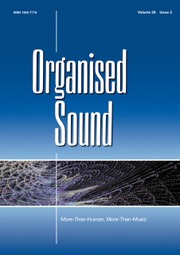Article contents
Dwelling and the Sacralisation of the Air: A note on acousmatic music
Published online by Cambridge University Press: 28 June 2011
Abstract
This paper adapts Martin Heidegger's philosophy of ‘dwelling’ in order to effect a liaison between acousmatic music and ecological concern. I propose this as an alternative to both the propagandist use of music as a means of protest and to using the science of ecology as a domain that might furnish new compositional means. I advance the interpretation that acousmatic music ‘occupies the air’ in ways that transform the meaning of that dimension. It allows the sky to be sky and the earth, earth. I use the precedent of bell ringing as an example of sonic activity that occupies the air in order to further dwelling.
- Type
- Articles
- Information
- Copyright
- Copyright © Cambridge University Press 2011
References
- 1
- Cited by




